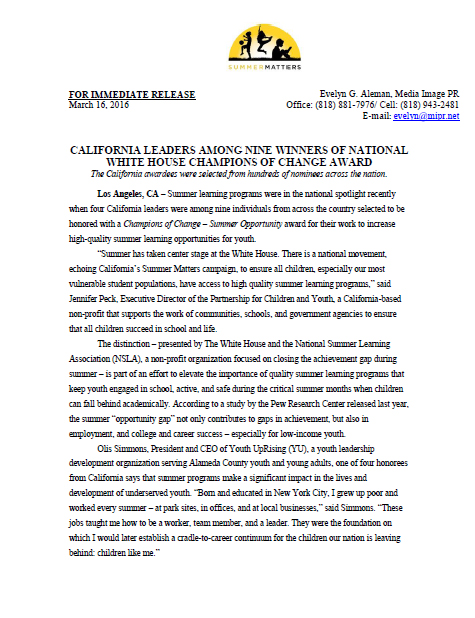California Leaders Among Nine Winners of National White House Champions of Change Award
The California awardees were selected from hundreds of nominees across the nation.
Los Angeles, CA – Summer learning programs were in the national spotlight recently when four California leaders were among nine individuals from across the country selected to be honored with a Champions of Change – Summer Opportunity award for their work to increase high-quality summer learning opportunities for youth.
“Summer has taken center stage at the White House. There is a national movement, echoing California’s Summer Matters campaign, to ensure all children, especially our most vulnerable student populations, have access to high quality summer learning programs,” said Jennifer Peck, Executive Director of the Partnership for Children and Youth, a California-based non-profit that supports the work of communities, schools, and government agencies to ensure that all children succeed in school and life.
The distinction – presented by The White House and the National Summer Learning Association (NSLA), a non-profit organization focused on closing the achievement gap during summer – is part of an effort to elevate the importance of quality summer learning programs that keep youth engaged in school, active, and safe during the critical summer months when children can fall behind academically. According to a study by the Pew Research Center released last year, the summer “opportunity gap” not only contributes to gaps in achievement, but also in employment, and college and career success – especially for low-income youth.
Olis Simmons, President and CEO of Youth UpRising (YU), a youth leadership development organization serving Alameda County youth and young adults, one of four honorees from California says that summer programs make a significant impact in the lives and development of underserved youth. “Born and educated in New York City, I grew up poor and worked every summer – at park sites, in offices, and at local businesses,” said Simmons. “These jobs taught me how to be a worker, team member, and a leader. They were the foundation on which I would later establish a cradle-to-career continuum for the children our nation is leaving behind: children like me.”
Alec Lee, an honoree from the San Francisco Bay area – co-founder and Executive Director of Aim High, a nonprofit serving middle schools in the San Francisco Bay area that narrows the achievement gap by engaging students in free summer learning programs – says that summer learning loss is really an opportunity gap.
“Summer learning loss is responsible for two-thirds of the achievement gap, which is really an opportunity gap since students whose families can afford summer camp or music lessons, for example, fall behind less and less often. In contrast, students whose parents can’t afford these summer activities, fall behind faster and more frequently. I feel that the award really belongs to the whole Aim High community – our staff, teachers, parents, and students. All of those who commit to Aim High summer after summer,” he added.
For more information about summer learning programs, Summer Matters, and/ or interviews, please contact Evelyn G. Alemán at (818) 881-7976 (office) or via e-mail at evelyn@mipr.net. You can also visit www.summermatters.net or view the video Summer Learning: An Inspiring Alternative to Summer School at this link: http://www.summermatters.net/summer-learning-an-inspiring-alternative-to-summer-school/
# # #
Summer Matters is a statewide campaign that expands access to high quality summer learning opportunities for all students in California, and raises awareness about the devastating effects of summer learning loss and the beneficial impact of summer learning programs.
The campaign, which is co-chaired by State Superintendent of Public Instruction Tom Torlakson and Jennifer Peck, Executive Director of Partnership for Children and Youth, is comprised of a diverse statewide coalition of educators, policymakers, advocates, school district leaders, parents, and others all working collaboratively to promote summer learning.
Summer Matter’s work is showcased in 12 summer learning communities including: Concord, Gilroy, Glenn County, Fresno, Los Angeles, Oakland, Sacramento, San Bernardino, San Francisco, San Jose, Santa Ana, and Whittier. Three of these summer learning programs are STEM education-focused.
The Partnership for Children & Youth is a California-based non-profit that supports communities, schools, and government agencies to work together as unified systems to ensure all children have the learning, health, and social supports they need to succeed in school and life.




